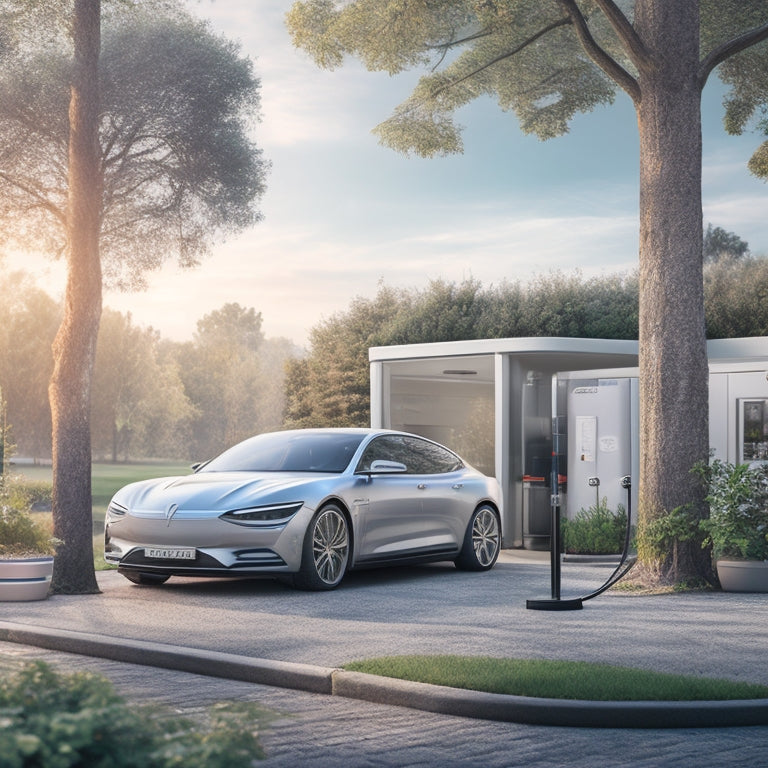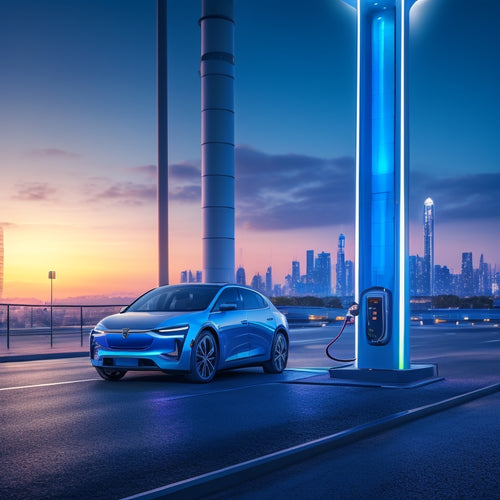
7 Best Home Electric Vehicle Charging Station Setups
Share
When selecting a home electric vehicle charging station setup, consider a Level 2 charging station with a dedicated 40-amp circuit, guaranteeing safe and efficient charging. Smart charging options with Wi-Fi connectivity allow remote monitoring and scheduling. For long trips, plan your route around fast-charging stations. Weather-resistant charging stations and corrosion-resistant materials guarantee durability. Hardwired charging stations provide reliable power, while portable Level 2 charging cables offer convenience. Solar-powered EV charging systems reduce your carbon footprint. From cost-effective solutions like ClipperCreek to smart charging options like ChargePoint, find the best fit for your needs, and take the first step towards a seamless EV charging experience.
Key Takeaways
• Consider a 240-volt Level 2 charging station with a dedicated 40-amp circuit for safe and efficient charging.
• Average installation costs range from $500 to $2,000, depending on complexity and distance.
• Look for smart charging stations with Wi-Fi connectivity for remote monitoring and scheduling charging sessions during off-peak hours.
• Choose a charging station with corrosion-resistant materials, such as stainless steel or anodized aluminum, for durability and aesthetics.
• Research and compare different charging station models, considering factors like power output, cable management, and safety features.
Level 2 Charging Station Essentials
You'll need a 240-volt charging station, a dedicated 40-amp circuit, and a charging cord with a SAE J1772 connector to guarantee safe and efficient Level 2 charging. This setup guarantees your electric vehicle (EV) receives a consistent flow of electricity, reducing charging times by a large margin.
When it comes to Circuit Requirements, a dedicated 40-amp circuit is essential to support the high-power charging demands of your EV. This means you'll need to install a new circuit specifically for your Level 2 charging station.
Installation Costs will vary depending on factors like the complexity of the installation, the distance from the electrical panel, and local electrician rates. On average, you can expect to pay between $500 to $2,000 for a professional installation. Keep in mind that some electric vehicle manufacturers offer installation services or partnerships with certified electricians, which can help reduce costs.
Smart Charging With Wifi Connectivity
When setting up your home electric vehicle charging station, you'll want to explore the benefits of smart charging with Wi-Fi connectivity.
With a Wi-Fi enabled charger, you'll be able to control and monitor your charging sessions remotely, receiving notifications and updates on your device.
This feature also allows you to schedule charging sessions during off-peak hours, optimizing your energy usage and reducing your electricity costs.
Wi-Fi Enabled Charging
With Wi-Fi enabled charging stations, you can seamlessly monitor and control your electric vehicle's charging process remotely through a dedicated mobile app. You will receive real-time updates on charging status, energy consumption, and can even schedule charging sessions to optimize your energy costs.
This smart charging technology allows you to keep track of your energy usage and adjust your charging habits accordingly. Additionally, Wi-Fi enabled charging stations often integrate with home automation systems. This enables you to control and monitor your charging station alongside other smart devices in your home.
When it comes to network security, reputable manufacturers make certain that their Wi-Fi enabled charging stations employ robust encryption and secure data transmission protocols. This is to safeguard your personal data and prevent unauthorized access.
Remote Charging Control
Through remote charging control, your smartphone becomes a command center, letting you start, stop, or pause charging sessions from anywhere, at any time, using a dedicated mobile app that leverages Wi-Fi connectivity. This feature gives you unparalleled flexibility and convenience, ensuring your EV is always ready to hit the road when you need it.
Here's a breakdown of the benefits:
| Feature | Description |
|---|---|
| Scheduled Charging | Set charging sessions to occur during off-peak hours, taking advantage of lower electricity rates |
| Remote Start | Start charging instantly, even when you're not near your EV |
| Real-time Monitoring | Keep tabs on your EV's charging status, energy consumption, and more, all from your phone |
With remote charging control, you can optimize your charging schedule, reduce energy costs, and enjoy a seamless charging experience. Whether you're at home, at work, or on-the-go, your smartphone becomes an extension of your EV, giving you complete control over your charging needs.
Fast Charging for Long Trips
When planning a long road trip in your electric vehicle, you'll want to think about how you'll recharge on the go. You'll need to know where to find rapid recharge stations along your route, and how to make the most of highway charging networks.
Rapid Recharge on Road
Quickly recharging your electric vehicle on long trips is vital, and that's where fast-charging stations come in, providing a speedy top-up to get you back on the road in no time. When planning a road trip, it's important to know where to find these charging stations, especially at Public Reststops and Highway Hubs.
| Charging Station | Charging Speed |
|---|---|
| Tesla Supercharger | up to 170 kW |
| EVgo Fast Charging | up to 100 kW |
| ChargePoint Express | up to 400 kW |
| Electrify America | up to 150 kW |
When stopping at these stations, you can expect to recharge your vehicle's battery to 80% in about 30-45 minutes, depending on the charger's power output. Keep in mind that some stations may have different connectors, so it's important to confirm your vehicle is compatible before stopping. With the right planning and knowledge, you can enjoy a stress-free road trip, knowing you can quickly recharge your electric vehicle whenever you need to.
Highway Charging Networks
As you start on long trips, depending on a thorough highway charging network becomes essential, especially when you need to cover vast distances without running low on juice. You'll want to know that you can quickly recharge at convenient locations along the way. That's where highway charging networks come in. These networks provide fast and reliable charging infrastructure, giving you peace of mind on long road trips.
Here's what you can expect from a well-developed highway charging network:
-
Convenient locations: Charging stations strategically placed near highways, rest stops, and travel centers, making it easy to charge up and get back on the road.
-
Fast charging speeds: High-power charging stations that can refill your battery to 80% in under 30 minutes, minimizing downtime.
-
Robust charging infrastructure: Robust and well-maintained charging stations that minimize downtime and ensure a consistent flow of electricity.
-
Easy payment options: Seamless payment systems that let you pay with a credit card, mobile app, or membership program.
-
Real-time station status: Up-to-the-minute updates on station availability, helping you plan your charging stops in advance.
Long-Distance Charging Plans
To guarantee uninterrupted long-distance travel, you'll need a well-thought-out long-distance charging plan that incorporates fast charging stops every 100 to 200 miles, depending on your vehicle's range and charging capabilities. This plan should include route planning, identifying convenient charge stops along your route, and making sure you have access to reliable charging networks.
Here's a breakdown of what to keep in mind when planning your long-distance charging route:
| Route Planning Consideration | Why It Matters |
|---|---|
| Vehicle Range and Charging Speed | Know how far you can go and how quickly you can recharge |
| Charging Network Availability | Ensure access to reliable charging networks along your route |
| Charge Stop Frequency | Plan for regular charge stops to avoid range anxiety |
| Route Adjustments for Charging | Be prepared to adjust your route for the best charging opportunities |
| Emergency Charging Contingency | Identify backup charging options in case of unexpected delays |
Outdoor Weather-Resistant Charging
Your outdoor electric vehicle (EV) charging station requires a weather-resistant setup to guarantee safe and reliable charging, regardless of the elements, and this is achieved through the use of specialized equipment and installation methods.
To guarantee your outdoor EV charging station can withstand the harsh outdoor environment, you'll need to focus on weatherproofing. Here are some essential components to contemplate:
-
Weatherproof enclosures: Sealed units that protect the charging station's electrical components from rain, snow, and extreme temperatures.
-
UV-resistant cables: Cables designed to endure the sun's harmful rays, preventing damage and degradation.
-
Water-resistant connectors: Sealed connectors that prevent water ingress, ensuring a safe and reliable connection.
-
Elevated mounting: Installing the charging station on a pedestal or wall mount to keep it above floodwaters and snowdrifts.
-
Corrosion-resistant materials: Using materials like stainless steel or anodized aluminum to prevent rust and corrosion.
Hardwired Charging Station Solutions
When setting up a hardwired charging station, you'll need to guarantee a safe and efficient connection by selecting the appropriate gauge wire and electrical components that can handle the increased power output. This is essential to make certain your charging station can support your vehicle's electrical capacity. A hardwired charging station provides a faster and more reliable charging experience compared to portable Level 2 charging cables.
Here's a comparison of popular hardwired charging station solutions:
| Charging Station | Electrical Capacity | Installation Costs |
|---|---|---|
| ChargePoint Home | 32A, 240V | $500-$700 |
| Tesla Wall Connector | 40A, 240V | $400-$600 |
| ClipperCreek HCS-40 | 32A, 240V | $300-$500 |
| Leviton Evr-Green 320 | 32A, 240V | $250-$400 |
| Siemens VersiCharge | 32A, 240V | $200-$350 |
When choosing a hardwired charging station, consider the electrical capacity and installation costs. Be sure to select a solution that meets your vehicle's charging requirements and fits within your budget. A professional electrician can help you with the installation process, ensuring a safe and efficient connection.
Portable Level 2 Charging Cables
You can opt for a portable Level 2 charging cable as an alternative to a hardwired charging station, providing you with the flexibility to charge your vehicle at various locations. This setup is ideal for those who need to charge their EVs at different spots, such as at home, at work, or at a friend's place.
When choosing a portable Level 2 charging cable, consider the following features:
-
Cable Management: Look for cables with built-in cable organizers or retractable reels to keep your charging area tidy and prevent damage to the cable.
-
Vehicle Compatibility: Make sure the cable is compatible with your EV's charging port and can deliver the required power output.
-
Length and Durability: Opt for a cable that's long enough to reach from the charging station to your vehicle, and is built with durable materials to withstand outdoor use.
-
Safety Features: Choose a cable with built-in safety features, such as overheat protection and surge protection, to guarantee safe and reliable charging.
-
Portability: Consider a cable that comes with a carrying case or bag for easy transportation and storage.
Solar Powered EV Charging Systems
Solar panels can be integrated with EV charging systems to provide a sustainable and renewable energy source, allowing homeowners to charge their electric vehicles while reducing their carbon footprint.
By harnessing the power of the sun, you can greatly decrease your reliance on the grid and minimize your energy bills. With a solar-powered EV charging system, you'll enjoy renewable integration, which means you'll be generating clean energy and using it to fuel your vehicle. This setup not only reduces greenhouse gas emissions but also provides energy independence, giving you control over your energy consumption.
When designing your solar-powered EV charging system, consider factors like your vehicle's charging capacity, the size of your solar array, and the type of charging station you'll need.
A grid-tied system with a net meter is a popular choice, as it allows you to sell excess energy back to the grid and offset your consumption. With the right setup, you can enjoy a seamless and sustainable charging experience, knowing you're driving on sunshine.
Frequently Asked Questions
Can I Install a Charging Station Myself or Do I Need a Professional?
If you're skilled with electrical work, you might be able to install a charging station yourself, but it's advisable to hire a licensed electrician to guarantee a safe and compliant installation, leveraging their expertise to overcome complex DIY challenges.
How Long Does It Take to Fully Charge an Electric Vehicle at Home?
"Did you know 80% of EV owners charge at home? You'll wait around 4-8 hours to fully charge your vehicle at home, depending on your car's battery capacity and charging speed, which can range from 3-7 kW."
Are Home Charging Stations Compatible With All Electric Vehicle Models?
When you're wondering if home charging stations are compatible with all electric vehicle models, remember that most stations adhere to EV model standards, ensuring vehicle compatibility, but it's important to check your vehicle's specifications to guarantee a seamless charging experience.
Can I Charge My Electric Vehicle With a Regular 120V Outlet?
"Think you're stuck in the slow lane with a regular 120v outlet? Think again! You can charge your electric vehicle, but be aware that outlet safety is key, and charging speed will be a sluggish 4-5 miles per hour."
Do I Need a Dedicated 240V Circuit for My Home Charging Station?
"You'll likely need a dedicated 240v circuit for your home charging station, as it demands higher electrical capacity; ensuring a safe, efficient charge, and avoiding overloaded circuits, which can cause fires or damage."
Related Posts
-

Sustainable Commuting: Top Daily Use Electric Bicycles
You're looking to trade in your gas-guzzling vehicle for a more sustainable option, and a daily use electric bicycle ...
-

What Does EV Charging Station Installation Cost?
You can anticipate paying between $300 to $1,500 or more for an EV charging station installation, depending on the ty...
-

5 Best Online Stores for Green Vehicle Solutions
You're on the hunt for an eco-friendly ride, and online stores are a great place to start. You'll find top retailers ...


